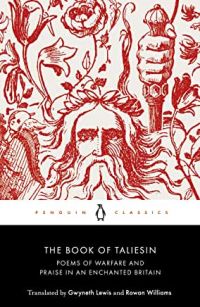Libro di Taliesin
| LIBRO DI TALIESIN | |
|---|---|

| |
| Titolo orig.: | Llyfr Taliesin |
| Autore: | Anonimo |
| Nazione: | {{{nazione}}} |
| Sezione: | Mitologia Gallese |
| Anno: | X sec. d.c. |
| Tipo: | Fonti Antiche |
| Genere: | Mitografie |
| Subgenere: | {{{subgenere}}} |
| Lingua orig.: | - |
| In Biblioteca: | No |
| Traduzione: | - |
Il libro di Taliesin porta il nome del bardo britannico Taliesin (c. 534 – c.599), che fu il primo poeta a scrivere in lingua gallese. Tuttavia, secondo gli studiosi fu scritto nel X secolo. Dato che tutta la poesia era trasmessa oralmente al tempo di Taliesin, un'ipotesi plausibile è che i suoi poemi furono messi per iscritto solo quattro secoli dopo di lui usando le ortografie del tempo.
Dei poemi del Libro di Taliesin dodici sono indirizzati a dodici re storici conosciuti quali Cynan Garwyn, re del Powys, e Gwallogap Llaennog dell'Elmet. Otto, tuttavia, sono indirizzati a Urien Rheged. Un poema funebre è indirizzato a Owain, figlio di Urien. Il resto del libro contiene poemi con forti elementi mitologici, religiosi e sciamanici, ma anche elementi più tardi, frutto della realtà di chi mise per iscritto l'opera nel X secolo.
Tra questi vale la pena citare l’incredibile Cad Goddeu, ovvero ‘La Battaglia degli Alberi’, divenuta poi parte integrante dello studio di accademici quali Robert Graves, che la analizza profondamente nel suo libro ‘La Dea Bianca, e il Preiddeu Annwfn, poema che narra l’avventura di Re Artù e dei suoi cavalieri volta a conquistare una lancia e un calderone.
STRUTTURA[modifica]
- I "Priv Cyfarch" ("Taliesin's First Address")
- II Marwnat y Vil Veib ("Elegy of a Thousand Sons", a memoir of the saints)
- III "Buarch Beird" ("The Fold of the Bards")
- IV "Aduvyneu Taliesin" ("The Pleasant Things of Taliesin")
- V Deus Duw ("O God, God of Formation", Of the Day of Judgment)
- VI "Armes Prydein Vawr" ("The Great Prophesy of Britain")
- VII "Angar Kyfyndawt" ("The Loveless Confederacy")
- VIII "Cad Goddeu" ("The Battle of the Trees")
- IX "Mab Gyrfeu Taliesin" ("The Childhood Achievements of Taliesin")
- X "Daronwy" ("Daronwy")
- XI "Cadau Gwallawc" ("Song on Lleenawg")
- XII "Glaswawt Taliesin" ("The Praise of Taliesin")
- XIII "Kadeir Taliesin" ("The Chair of Taliesin")
- XIV "Kerd Veib am Llyr" ("Song Before the Sons of Llyr")
- XV "Kadeir Teyrnon" ("The Chair of the Sovereign")
- XVI "Kadeir Kerrituen" ("The Chair of Cerridwen")
- XVII "Kanu Ygwynt" ("The Song of the Wind")
- XVIII Kychwedyl am dodyw ("A rumour has come to me")
- XIX "Kanu y Med" ("Song of Mead")
- XX "Kanu y Cwrwf" ("Song of Ale")
- XXI "Etmic Dinbych" ("Praise of Tenby")
- XXII "Plaeu yr Reifft" ("The Plagues of Egypt", Mosaic history)
- XXIII "Trawsganu Kynon" ("Satire on Cynan Garwyn")
- XXIV Lath Moessen ("The Rod of Moses", Of Jesus)
- XXV Torrit anuyndawl (Song of the Horses)
- XXVI Y gofiessvys byt ("The Contrived World", Of Alexander)
- XXVII Ar clawr eluyd ("On the Face of the Earth", Of Jesus)
- XXVIII Ryfedaf na chiawr (Of Alexander the Great)
- XXIX Ad duw meidat ("God the Possessor", Hymn to the god of Moses, Israel, Alexander)
- XXX "Preiddeu Annwfn" ("The Spoils of Annwn")
- XXXI "Gwaeith Gwen ystrad" ("The Battle of Gwen ystrad")
- XXXII Urien Yrechwydd (A Song for Urien Rheged)
- XXXIII Eg gorffowys (A Song for Urien Rheged)
- XXXIV Bei Lleas Vryan (A Song for Urien Rheged)
- XXXV "Gweith Argoet Llwyfein"("The Battle of Argoed Llwyfain")
- XXXVI Arddwyre Reged (A Song for Urien Rheged)
- XXXVII "Yspeil Taliesin" ("The Spoils of Taliesin")
- XXXVIII Rhagoriaeth Gwallawc(Song on Gwallawg ab Lleenawg)
- XXXIX "Dadolwch Vryen" ("The Satisfaction of Urien")
- XL "Marwnat Erof" (Elegy of Erof [Ercwlf])
- XLI "Marwnat Madawg" (Elegy of Madawg)
- XLII "Marwnat Corroi ap Dayry" (Elegy of Cu-Roi son of Daire)
- XLIII "Marwnat Dylan eil Ton" (Elegy of Dylan son of the Wave)
- XLIV "Marwnat Owain ap Vryen" (Elegy of Owain son of Urien)
- XLV "Marwnat Aeddon" (Elegy of Aeddon)
- XLVI "Marwnat Cunedda" (Elegy of Cunedda)
- XLVII "Armes Prydein Bychan" ("The Lesser Prophesy of Britain")
- XLVIII "Marwnat Vthyr Pen" (Elegy of Uthyr Pen(dragon))
- XLIX Kein gyfedwch ("A bright festivity")
- LI Trindawt tragywyd ("The Eternal Trinity")
- LII "Gwawt Lud y Mawr" ("The Greater Praise of Lludd")
- LIII Yn wir dymbi romani kar ("Truly there will be to me a Roman friend")
- LIV "Ymarwar Llud Bychan" ("The Lesser Reconciliation of Lludd")
- LV "Kanu y Byt Mawr" ("Great Song of the World")
- LVI "Kanu y Byt Bychan" ("Little Song of the World")
- LVII Darogan Katwal[adr?] ("Prophecy of Cadwallader" (è pervenuto solo il titolo))
